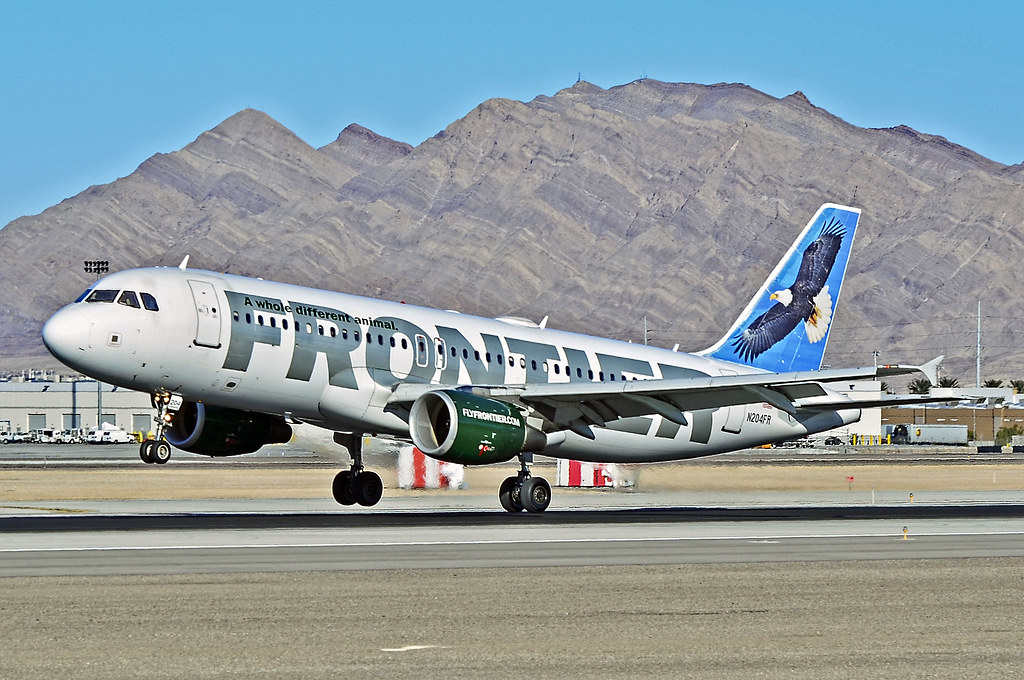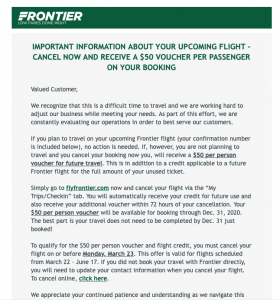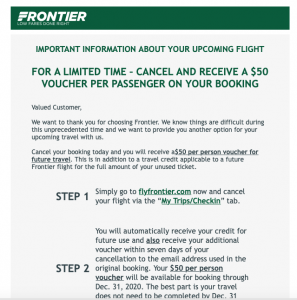Opinion: How to get your air travel refund in the time of COVID-19

Frontier Airlines jet. Courtesy: Tomas Del Coro.
I was going to miss SXSW by a week anyway, but then SXSW was canceled, sports were canceled and concerts were canceled, and it was best to cancel my family’s April vacation to Austin. I had a reservation with Frontier Airlines, and that same day I received an email touting the airline’s generous COVID-19 cancelation policy. I could reschedule or cancel free of charge and rebook, paying only the difference in price. Still hopeful, I called and asked for the trip to be moved up by 45 days, into mid-May.
“It’s much easier if you cancel, really,” was the answer I got from the probably overworked Philippines-based customer service rep, after first waiting on hold for an hour to get someone.
OK. I went ahead and canceled, rebooked for May and started the arduous waiting process. Would the shelter-in-place get extended for a second time, past May 3? Would Texas re-open its museums and restaurants?
In the meantime, Frontier began barraging my inbox with bigger! Better! Deals! Cancel your reservation now and get an additional $50 credit for each passenger. Sounds great, right?
“This is in addition to a credit applicable to a future Frontier flight for the full amount of your unused ticket. Your $50 per person voucher will be available for booking through Dec. 31, 2020. The best part is your travel does not need to be completed by Dec. 31 just booked!” the emails said, shady grammar aside.
The following emails included step-by-step flight cancelation tips, and then, surprise! An extension of this awesome promotion.
I didn’t have to wait very long because several days later, Frontier canceled my direct flight and instead routed my family through Denver, with a 20-hour layover, both ways. That wouldn’t work, but I also didn’t know whether I’d need to push my trip out again. And it took hours to rebook hotels and a rental car the first time around. I didn’t want to have to go through that again. I preferred a refund. After another hour on hold with the Philippines, I found a supervisor who agreed. She promised me a partial refund and a confirmation email within 10 minutes.
Six hours later I still hadn’t gotten that confirmation email so I called back and began a 24-hour odyssey with customer service reps who at first denied my call the previous day had occurred and said my reservation was still on the books. Their next claim was that because I canceled my original flight myself—rather than being rebooked over the phone—it was impossible for me to get a refund.
As I would later learn, an airline’s contract of carriage states that if an airline ever cancels or changes your reservation and you’re not satisfied with it, you’re entitled to a refund. This includes any add-on services you may have purchased, like bag fees. My second flight was changed, but because I used credit from the first flight to pay for it, and that first flight I canceled myself, I was not going to get anything.
So while someone at Frontier was putting on an empathetic tone when writing, “We recognize that this is a difficult time to travel and we are working hard … evaluating our operations in order to best serve our customers,” the goal was to have as many people cancel their own flights as possible rather than face the possibility of having the airline change or cancel for them and forking over the refund.
I tried to reach the Frontier’s communications department to ask them about the policy, but the airline wasn’t answering its media line. Nor was their a voicemail option. I emailed its media department twice but did not get a response. I also tried to visit the airline’s media relations website, but it no longer seemed to exist.
I’m not the only one who’s been thinking about this in recent days—as the San Francisco Chronicle reported, nine U.S. Senators—including Kamala Harris, Democratic presidential candidate Bernie Sanders, and former presidential candidates Elizabeth Warren (Mass.) and Amy Klobuchar (Minn.)—sent airline carriers a letter warning them to provide full cash refunds to customers when flights are canceled, instead of offering future travel vouchers.
“These travel vouchers do the public little good in this time of emergency, especially when airlines require their redemption in as little as 90 days,” the letter states. “Americans need money now to pay for basic necessities, not temporary credits towards future travel.”
As the Chronicle noted, airlines typically offer those vouchers or credits while hiding the refund option unless the passengers bring it up in conversation, acknowledging they’re aware of the rule. So now you’re aware.
After more than a day of stalemated calls where my requests for a refund were flatly rejected, I called back and said I was aware of my rights under the airline’s contract of carriage. Within 10 minutes, I had my confirmation email of a full refund (rather than a partial one).
The airline industry just last week received a $25 billion bailout from Congress to keep it afloat during these times. The bailout, as far as I can tell, doesn’t specifically enforce the refunding of flights during these times. But that shouldn’t mean airlines shouldn’t enforce their existing rules, either. The senators asked the carriers if they will commit to a full refund policy for everyone, no matter who cancels the flight or reservation, including those people who have already received but not used their travel credits. The ball may be in their court now, but you should definitely be allowed to get your refund if the airline canceled or rescheduled your flight, and you should definitely put up a fight if you were pressured into canceling in the first place.
Follow editor Roman Gokhman at Twitter.com/RomiTheWriter.


